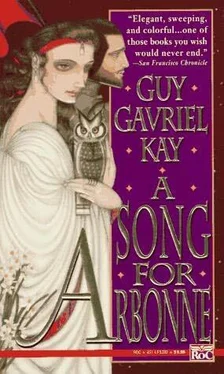Guy Kay - A Song for Arbonne
Здесь есть возможность читать онлайн «Guy Kay - A Song for Arbonne» — ознакомительный отрывок электронной книги совершенно бесплатно, а после прочтения отрывка купить полную версию. В некоторых случаях можно слушать аудио, скачать через торрент в формате fb2 и присутствует краткое содержание. Год выпуска: 1992, Жанр: Фэнтези, на английском языке. Описание произведения, (предисловие) а так же отзывы посетителей доступны на портале библиотеки ЛибКат.
- Название:A Song for Arbonne
- Автор:
- Жанр:
- Год:1992
- ISBN:нет данных
- Рейтинг книги:5 / 5. Голосов: 1
-
Избранное:Добавить в избранное
- Отзывы:
-
Ваша оценка:
- 100
- 1
- 2
- 3
- 4
- 5
A Song for Arbonne: краткое содержание, описание и аннотация
Предлагаем к чтению аннотацию, описание, краткое содержание или предисловие (зависит от того, что написал сам автор книги «A Song for Arbonne»). Если вы не нашли необходимую информацию о книге — напишите в комментариях, мы постараемся отыскать её.
A Song for Arbonne — читать онлайн ознакомительный отрывок
Ниже представлен текст книги, разбитый по страницам. Система сохранения места последней прочитанной страницы, позволяет с удобством читать онлайн бесплатно книгу «A Song for Arbonne», без необходимости каждый раз заново искать на чём Вы остановились. Поставьте закладку, и сможете в любой момент перейти на страницу, на которой закончили чтение.
Интервал:
Закладка:
After that it became easy, in fact. Easier than it ought to have been, Blaise thought. At Iersen Bridge, King Duergar had died yet Gorhaut had still prevailed on a bitter field. The death of a king need not mean utter disarray among the ranks of his army.
That afternoon, though, it did. Blaise could have offered many reasons why, and any and all of those reasons might have been a part of it, but the truth—brilliantly clear in the afternoon light—was that the army of Gorhaut was undone from the time Urté de Miraval appeared against them and that red arrow came down to kill their king.
Blaise, battling in towards Bertran, began to recognize individual men in both armies nearer to the centre of the fighting. Sunset, he had said to Ademar. He had been denied that battle after all. Looking around, he remembered that there was someone else on this field he wanted for his own. Then he saw that man, some distance away, and realized that this, too, was going to be denied him.
Bertran de Talair came up to the Portezzan, Borsiard d'Andoria, on a tummock of grass in the midst of the sideslipping centre of the battle. It was clear that words were exchanged, but Blaise was too far away to hear them. Then he watched Bertran, who had set out on the road of a fighter more than twenty years ago after Aelis de Miraval had died in her husband's castle, dispatch the lord of Andoria with a precision that almost made a mockery of the notion of single combat. Two blows on the forehand, a feint, and then, slipping past the parry, a straight-ahead thrust that took Borsiard in the throat. It was more an execution than a duel, and when it was over Blaise's first thought was that Lucianna had just been widowed again.
His second thought, as he saw the Andorians begin, predictably, to throw down their weapons and hastily submit themselves as prisoners to the nearest of Bertran's men, was that he had something to do now that was going to be harder than any combat had been. He looked quickly around for Rudel and realized that his friend was no longer by his side. He had no time to wonder about that. Even as he watched, the battle of Lake Dierne was becoming a slaughter.
And he had to stop it. Stop it, even though the men of Arbonne could see the severed heads spitted on pikes at the back of the Gorhaut ranks, could still see what a hideous ruin had been made of the singer named Aurelian, and would all be carrying within them anguished images of women burning through the north of their land. They would not be inclined to clemency and moderation in this moment when certain defeat had turned into victory. Every man in the army of Arbonne would know what his fate and that of his family would have been had Gorhaut triumphed here.
Bertran was going to be no help to him now, Blaise saw. The duke had turned from his ruthless dispatching of Borsiard and, moving straight past the surrendering Portezzans, was cutting a deadly swath through the nearest men of Gorhaut. Valery, beside him, was doing exactly the same thing.
Urging his horse after them, Blaise lifted his voice over the screams of the dying and the fierce, wild shouts of the corans of Arbonne: " Enough!" he cried. " Bertran, it is enough!"
Valery slowed, and turned. The duke did not hear him or, if he did, paid no heed at all. Over to his left, behind the Gorhaut centre, Blaise saw Fulk de Savaric lift his head to his cry, raise a hand in response, and then turn to relay urgent orders to his men. The corans of Miraval were still attacking, driving in to meet Bertran, with panic-stricken soldiers of Gorhaut spinning and wheeling between them, implacable foes on all sides now, and men from their own ranks gone over to their enemies.
Blaise came up to the nearest of the Garsenc corans, the ones who had rallied to him when Rudel first raised the banner. " No more killing! " he ordered the nearest of them. "Make them throw down their weapons! They won't be killed if they do!" He was almost certain that was true, but not entirely so. There was a mood in the army of Arbonne that was near to being out of control.
He moved on, churning in the wake of the duke of Talair. He understood very well what had happened to Bertran, how battle-fury could overmaster the most clear-sighted of men—and he also knew that Bertran de Talair had more reason than a man should ever need to be killing men of Gorhaut just now.
In the end it was Thierry de Carenzu, over on the right flank, nearest the severed heads and the maimed, dead troubadour, who had the horns sounded to put a halt to the slaughter of men.
It was Thierry who did it, Blaise would always remember that; he himself was of Gorhaut, he could not have halted the army of Arbonne that day.
Even Bertran pulled up his horse when he heard the high clear sweet notes of those horns rising above the valley. It was music of a sort, among the dying and the dead. Blaise, forcing his way forward, was finally able to catch up with him.
"Bertran stop, you must stop. These are only soldiers now. Farmers and villagers. Ademar is dead, it is over!" The duke of Talair turned then to look at him and Blaise was sobered and chilled by what he saw in the other man's eyes.
"But I did not kill him," Bertran said slowly, as if in a trance. There was something terrible in the words.
Drawing a deep breath, Blaise said carefully, "Nor did I, with as much cause, perhaps. It must not be allowed to matter, Bertran, for either of us. We have won. And look, the men of Garsenc are forcing the others to surrender."
It was true. The soldiers of Gorhaut, the crusading army of the god, could be seen throwing down their weapons even as they spoke. Blaise saw Thierry riding towards them. He shouted as he approached: "We must not kill unarmed men, Bertran."
"Will you tell me why? I seem to have forgotten." Bertran's eyes were still wild, lost.
"No you haven't," said Valery from behind his cousin. They turned to him; his own features were calm again, though Blaise could see that that control was costing Valery a great deal. "You haven't forgotten at all. You just want to forget. So do I. Oh, Bertran, so do I, but if we do that we become what we have just defeated."
Blaise had said the same thing once, in the serenity of a council chamber. This was a battlefield, and there was a kind of madness in the blue eyes of the man Valery was addressing. Bertran stared coldly for a long moment at his cousin. Then Blaise saw him shake his head several times, as if trying to slip free of something. He understood; he understood better than Bertran could have known, how hard it was to move past battle-rage to anything else at all.
But when Bertran turned back to him and to Thierry beside him, Blaise saw that his expression was one he knew.
"Very well," said the duke of Talair, "we will accept their surrender. There is a last thing that is still to be done, though it might grieve you, Blaise, I don't know." He paused only briefly. "Where is the High Elder of Gorhaut?"
Amazingly, Blaise had managed to push his father from his mind; or perhaps, given all that had now broken into fragments in the world, it wasn't so amazing after all. He turned towards the knot of men west of them, and standing in their midst—unhorsed but towering above even the tallest man there—he saw his father.
Galbert had removed his helm, or had had it taken from him. He stood bareheaded in the light of late afternoon. There was blood on his face and on his blue robe. A space had been cleared around him and, looking, Blaise realized belatedly where Rudel had gone. His friend was standing with Galbert inside that space, sword drawn, calmly levelling it at the man who, a little more than half a year ago, had offered him a quarter of a million in gold to kill Bertran de Talair.
This was, Blaise understood finally, one more score being settled, as the sun moved west in the winter sky. He wondered why his father had not killed himself rather than be given over in this fashion to his enemies. It was only a brief thought though, that one. Galbert was not a man to take such a way out, and it was, in any event, an action forbidden by the god.
Читать дальшеИнтервал:
Закладка:
Похожие книги на «A Song for Arbonne»
Представляем Вашему вниманию похожие книги на «A Song for Arbonne» списком для выбора. Мы отобрали схожую по названию и смыслу литературу в надежде предоставить читателям больше вариантов отыскать новые, интересные, ещё непрочитанные произведения.
Обсуждение, отзывы о книге «A Song for Arbonne» и просто собственные мнения читателей. Оставьте ваши комментарии, напишите, что Вы думаете о произведении, его смысле или главных героях. Укажите что конкретно понравилось, а что нет, и почему Вы так считаете.










